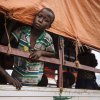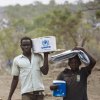
UNHCR report sees 2017 resettlement needs at 1.19 million
UNHCR report sees 2017 resettlement needs at...
UNHCR: With a multitude of conflicts and crises causing record displacement around the world, resettlement has become an increasingly vital part of the UN Refugee Agency’s efforts to find solutions and advocate for fairer responsibility-sharing for refugees, a UNHCR report released today found.
The Projected Global Resettlement Needs 2017 report was released at an annual meeting in Geneva on Monday (June 13). It says that more than one million refugees were submitted by UNHCR to over 30 resettlement countries in the past decade, the number of people in need of resettlement far surpasses the opportunities for placement in a third country.
The report says that despite increased resettlement quotas from some countries, expansion in global resettlement capacity, and increases in submissions, the projected number of people in need of resettlement in 2017 will pass 1.19 million.
In response, UNHCR expects to submit 170,000 refugees for resettlement next year, based on the expected global quotas from resettlement states. This compares to a current target of some 143,000 in 2016 and more than 100,000 in each of 2015 and 2014 respectively. Despite the increase in quotas from states and submissions made, the gap in terms of needs remains great.
The 1.19 million forecast is up 72 per cent on the projected needs of 691,000 in 2014, before large-scale resettlement of Syrians began. In 2017, Syrians are projected to account for 40 per cent of needs, followed by Sudan (11 per cent), Afghanistan (10 per cent) and the Democratic Republic of the Congo (9 per cent).
Projected Global Resettlement Needs also reports that 2015 was a record year for submissions with 134,044, up 29 percent from the 103,890 recorded in 2014.
“We are seeing resettlement taken to a new level and that enhanced resettlement can be an effective means of sharing the responsibility for refugee protection,” High Commissioner for Refugees Filippo Grandi said. “But much more needs to be done to keep pace with the growing numbers of acutely vulnerable.
“Resettlement is now more important than ever as a solution, and we must grasp this opportunity to increase the number of refugees benefitting from it, as well as other avenues for admission,” he added. UNHCR estimates more than 1 million, are in need of resettlement because they are unable to return home or integrate in host countries for a variety of reasons.
The Syrian crisis marked a major shift in the focus of resettlement, which continues to resonate. By 2014, Syrians were the largest group referred for resettlement and by 2015 an average two out of every five submissions were Syrians compared to one out of five in 2014. Other top countries of origin in 2015 included Democratic Republic of the Congo (20,527), Iraq (11,161), Somalia (10,193) and Myanmar (9,738). These four countries and Syria, with 53,305, made up almost 80 per cent of submissions that year.
Resettlement remains an effective measure for people in need such as survivors of violence or torture, who last year accounted for 24 per cent of submissions – a quadrupling since 2005 – and women and girls at risk of abuse (about 12 per cent).
The United States in 2015 accepted 82,491 resettlement submissions from UNHCR in 2015 (62 per cent of all submissions), followed by Canada (22,886), Australia (9,321), Norway (3,806) and the United Kingdom (3,622).
In Africa, the number of submissions rose from 35,079 in 2014 to 38,870. A total 21,620 submissions came from Asia-Pacific countries in 2015, some 16 per cent of global submissions. This was a fall from previous years due in part to the pursuit of other solutions in the region.
In the America’s just 1,390 submissions were made in 2015, down from 1,800 in 2014 and reflecting efforts in Ecuador to focus on integration for Colombian refugees.
A total 53,331 referrals originated from UNHCR’s operations in the Middle East and North Africa region, up 130 percent from 2014 and some 40 per cent of the global total. UNHCR offices in Europe recorded the highest number of submissions this decade at 18,833, mostly from Turkey.
To tackle growing needs UNHCR is also focusing on how complementary paths such as humanitarian visas, family reunion and scholarships could help bridge the gaps in terms of needs. At a high-level conference in Geneva last March, UNHCR called on countries around the world to provide admission through resettlement and other channels to 10 per cent of Syrian refugees, or 480,000.
Projected Global Resettlement Needs 2017 was released on the first day of the Annual Tripartite Consultations for Resettlement, gathering representatives from UNHCR, resettlement countries and NGOs. Co-chaired by the Dutch government and the Dutch Council for Refugees in partnership with UNHCR, it is the most important multilateral forum to advance the resettlement agenda to the benefit of refugees and receiving communities.
http://www.unhcr.org/news/latest/2016/6/575e79424/unhcr-report-sees-2017-resettlement-needs-119-million.html
 Reload
Reload



